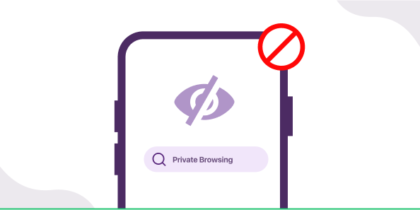Table of Contents
Have you ever shared your deepest fears and worries with a therapist, someone you trust to provide you with a safe space and ensure your words remain confidential? Now, think about what might happen if someone gained access to this conversation without your informed consent.
This unsettling scenario is becoming a real concern with the rise of teletherapy and telehealth services. While online therapy offers convenience and accessibility, the concerns about data breaches and privacy leaks can leave some therapy seekers feeling uneasy – and rightfully so.
What is Teletherapy and Why Is It Booming?
Teletherapy, or remote counseling, has surged in popularity over the past years. According to the report by the Business Research Company, the global online therapy services market size is expected to grow from an estimated $12.05 billion in 2024 to approx. $27 billion by 2027. That’s a rather huge jump.
However, the appeal is also clear.
Teletherapy is relatively more affordable than traditional in-person therapy. As per an article in Forbes, online therapy costs somewhere between $65 and $129 on average per session. Meanwhile, in-person therapy typically sets you back about $100 to $200 on average per session.
Additionally, teletherapy eliminates geographical barriers, making it accessible to those in remote areas or with mobility issues. The convenience of attending sessions from the comfort of your home is another significant draw. The supposed privacy of online therapy further adds to its attractiveness, but it’s essential to understand the full picture.

BetterHelp Controversy: A Wake-Up Call
The BetterHelp controversy highlights critical privacy issues in telehealth.
The Federal Trade Commission (FTC) recently took legal action against BetterHelp, a popular online counseling service, for allegedly mishandling user data. As part of a settlement, nearly 800,000 BetterHelp customers received refund notices, each getting just under $10.
This case is a stark reminder of the potential risks involved in online therapy, underscoring the importance of protecting sensitive mental health information. The FTC accused BetterHelp of using personal health data from therapy sessions for advertising purposes and sharing sensitive information – including email addresses, IP addresses, and health questionnaire information – with companies like Facebook and Snapchat, to name a few.
This incident raises serious questions about consent and the exploitation of people’s mental health struggles for targeted advertising. It’s a betrayal of trust that users placed in what they believed was a secure and private platform.
“While online therapy offers great convenience and accessibility, it does come with potential risks that must be acknowledged and mitigated,” said Briana Sefcik, the Director of Trauma and Family Wellness at The Last Resort Recovery Center, a nationally recognized and accredited addiction treatment center in Austin, Texas. “One of the primary risks associated with online therapy sessions is the potential for data breaches. Personal information and sensitive mental health details can be exposed if the platform used is not secure.”
Privacy and Security Concerns in Telehealth
While data breaches are a significant threat, they are not the only concern. Teletherapy platforms themselves can be vulnerable, potentially exposing your personal details or session content.
Here are some additional privacy concerns that might worry you:
Unseen Audiences:
Therapist Tyler J. Jensen warns about the risk of unintentionally exposing your session details if people are around while you’re on a call.
“In my initial therapy sessions conducted via telehealth, I always walk clients through best practices surrounding their privacy,” Jensen, a licensed psychotherapist told PureVPN. “[I] offer them suggestions like [placing] a noise machine at the door (maybe a couple), coming up with a signal if the session needs to pause or stop altogether, or utilization of chat features to communicate issues.”
Data Sharing
Many platforms have policies allowing them to share user data with third parties. Who gets this information and how do they use it? The lack of transparency leaves users feeling like their privacy is on shaky ground.
In other words, users often aren’t fully aware of who sees their information and what it’s used for, leading to feelings of insecurity
Lax Security
Platforms without proper encryption essentially leave your sessions open for anyone to listen in. It’s a chilling thought that can make opening up feel incredibly risky.
“The rising popularity of teletherapy indeed brings up valid privacy concerns,” said Philipp Staiger, the co-founder and COO of Priverion – a SwissTech company offering data privacy and InfoSec products. “From my experience with Priverion and the SIDD Institute, one effective measure I strongly advocate for is ensuring that all teletherapy platforms implement robust end-to-end encryption. This ensures that any data exchanged remains unreadable to unauthorized parties, maintaining the confidentiality of therapy sessions.”
Read More: Privacy Alert for Women: Are Health Apps Compromising Your Data?

How to Get Privacy During Online Therapy
Despite these concerns, there are steps you can take to protect your privacy during teletherapy:
Be Smart and Savvy
First things first, you must thoroughly research teletherapy platforms before signing up. Look for those with strong data security measures and clear privacy policies. End-to-end encryption is crucial. Don’t forget to ask your therapist about their data security practices as well. After all, even some of the best teletherapy platforms may end up leaking your sensitive information.
Secure Your Connection
Another rule of thumb is to avoid public WiFi for therapy sessions. After all, you never know what kind of people or criminals could be lurking around on an unsecured network, listening into your conversations. So, it’s always better to use a private, secure network at home to better protect your information. However, if you travel frequently or rely on public networks, use PureVPN to encrypt your internet traffic.
Find Your Sanctuary
Choose a quiet, private space for your sessions to ensure no one can overhear your conversation. It may feel less daunting to have an online therapy session in your favorite coffee shop or library, but these places are usually bustling with people, some of whom could try to eavesdrop.
Not to mention, a safe physical environment also enhances emotional well-being during therapy.
Know Your Rights
Most importantly, familiarize yourself with HIPAA regulations that protect your medical privacy. It may seem a little daunting, but remember, knowledge empowers you to make informed decisions about your digital privacy.
“Most platforms have encrypted conversations, but make sure your chosen one follows HIPAA (Health Insurance Portability and Accountability Act) guidelines,” said Lindsey Tong, the Clinical Director at Profound Treatment, a treatment center in Los Angeles. “Check that your therapist uses a secure, encrypted platform and doesn’t share sessions without permission.”
Ensuring Digital Privacy in Mental Healthcare
There is no denying that we need stronger regulations to create a secure environment for teletherapy. However, you as a user also have a powerful voice.
Here’s how you can advocate for better practices:
Demand Transparency
If you seek online therapy, ask teletherapy platforms for clear and comprehensive privacy policies. Understanding how your information is handled is the first step to safeguarding it.
Advocate for Stronger Laws
You can also push for stricter data protection laws that govern teletherapy services. Mental health information is sensitive and deserves robust legal protection, so don’t be afraid to raise your voice about it.
Hold Platforms Accountable
The BetterHelp case underscores the need for stricter enforcement mechanisms to ensure platforms prioritize user privacy. Holding them accountable is essential for maintaining trust.
On a Final Note
Teletherapy has many pros. For starters, it can significantly improve mental health accessibility, breaking down barriers and providing crucial support. However, the challenges of online counseling cannot be ignored.
That being said, privacy concerns shouldn’t prevent you from seeking help.
However, being proactive is key. You must also consider demanding better practices from platforms and advocating for stronger regulations. Remember, we all deserve a future where online therapy is both effective and secure.
So, let’s work together to ensure your most private conversations remain confidential. You deserve to feel safe sharing your heart, both online and offline.
To learn more about how to protect your privacy in the digital age, stay connected to PureVPN Blog.
Read More: Mind Meld or Money Grab? Protecting Your Neural Privacy in Techwear



